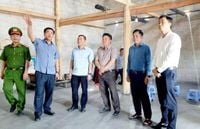In a significant move to optimize public resources, Vietnam is set to address the issue of surplus public assets following the recent administrative mergers across provinces and communes. According to Mr. Dang Hung Vo, the former Deputy Minister of Natural Resources and Environment, effective management of these surplus assets could unlock substantial funding for critical infrastructure projects, including the much-anticipated North-South high-speed railway.
As Vietnam undergoes a reorganization of its administrative units, nearly 130,000 civil servants and public employees have been laid off, leading to a surplus of public properties. Mr. Vo emphasized the need for a dedicated agency to oversee the evaluation and repurposing of these assets, stating, "If surplus public assets are handled effectively when arranging administrative units, the State will have more resources to build the North-South high-speed railway and other transport infrastructure."
This sentiment was echoed in discussions surrounding the establishment of a National Committee or Steering Committee, which would be empowered by the Prime Minister to formulate solutions for the surplus properties. Mr. Vo noted that the committee's role would be to coordinate with local governments to ensure swift decision-making, preventing any degradation of these assets.
He pointed out the paradox that often arises in public asset management: central agencies utilize land while local authorities manage it, leading to inefficiencies. "This situation results in a disconnect where central authorities do not heed local requests for asset reassignment," Mr. Vo explained. He argued that to resolve this issue effectively, direct intervention from the Government is essential.
Moreover, the merging of administrative units presents an opportunity to reorganize public assets for efficient use. In a recent discussion, experts calculated that the total value of these public properties could be substantial enough to fund major projects like the North-South high-speed railway or the Long Thanh airport. Mr. Vo stated, "Arranging surplus public headquarters is an opportunity to unlock a significant resource for national development."
In addition to these discussions, the Ministry of Home Affairs has issued guidance to support officials and civil servants affected by the restructuring process. Official Letter No. 2034/BNV-TCBC outlines policies under Decree No. 178/2024/NĐ-CP, which aims to assist those affected by the reorganization of the political system. The guidance includes provisions for streamlining staff and enhancing the quality of public service personnel.
Mr. Vu Trong Binh, Director of the Department of Employment, reported that about 100,000 civil servants and public employees will be impacted during the initial phase of this restructuring. The Department is taking proactive steps to connect these workers with new employment opportunities, emphasizing the importance of tailored support for different groups, such as younger workers and those over 50.
He stated, "There are many different groups of workers, and we need to adopt different policy approaches for each group." This highlights the need for a nuanced strategy to ensure that those transitioning from the public sector can find suitable employment.
Furthermore, Mr. Binh noted that the nationwide labor market comprises approximately 54 million workers, and while the loss of 100,000 public sector jobs is significant, it is unlikely to cause major fluctuations in the broader labor market. "These positions span various industries and professions across 63 provinces, so the impact will be distributed," he explained.
As part of the support for those leaving public service, workers are encouraged to apply for unemployment insurance at local Employment Service Centers or through the National Public Service Portal. Mr. Vu Quang Thanh, Deputy Director of the Hanoi Employment Service Center, outlined the process for workers to access unemployment benefits, including vocational training and job placement services.
In addition to the government’s efforts, the Ministry of Home Affairs has emphasized the importance of maintaining stability within the political system while enhancing the quality of the workforce. The guidance also extends to public non-business units managed by the district level, which may undergo reorganization according to new administrative boundaries.
Despite the challenges posed by the restructuring, there are encouraging signs of progress in other areas. Reports indicate that the program to eliminate temporary and dilapidated housing in Vietnam has gained momentum, with thousands of families benefiting from new, stable homes. The Provincial Steering Committee for this initiative has approved the renovation or construction of over 10,000 houses, showcasing a commitment to improving living conditions for vulnerable populations.
As the nation navigates these significant changes, the emphasis remains on ensuring that no one is left behind during the transition. The political will to support these initiatives reflects a broader commitment to social equity and economic development.
In summary, Vietnam's approach to managing surplus public assets and supporting civil servants during this period of transition presents both challenges and opportunities. The government's proactive stance, coupled with community engagement and strategic planning, aims to create a more efficient and effective public service landscape.





